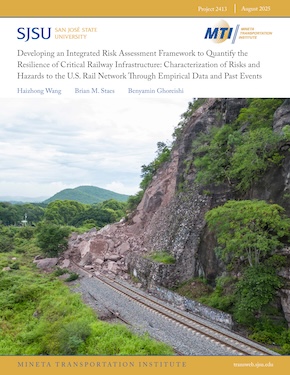- 408-924-7560
- mineta-institute@sjsu.edu
- Donate
Developing an Integrated Risk Assessment Framework to Quantify the Resilience of Critical Railway Infrastructure: Characterization of Risks and Hazards to the U.S. Rail Network Through Empirical Data and Past Events
To improve understanding of the impact of natural hazards on the U.S. railway system, this project developed a comprehensive,geospatially precise dataset that maps historical hazard events to specific rail segments. The project provides insight into when,where, and how much damage natural hazards have inflicted on rail infrastructure across the country. While a rail-specific hazard database did not previously exist, this research combines data from the Geological Survey (USGS) Flood Events Database, Hydrologic Unit Codes (HUC), the National Centers for Environmental Information (NCEI) from the National Oceanic and Atmospheric Administration (NOAA), and the National Weather Service (NWS) forecast zones. Using accident cause codes (e.g., T002 for flood-related track damage and T109 for sun kinks) and the external hazard data, the researchers were able to estimate both the location and economic cost of damage. Findings revealed that from 2000 to 2023, certain hazard-linked derailments caused millions in track damage—$43 million from floods (M103) and up to $85 million from extreme heat events (T109). This work lays the foundation for a national rail-hazard damage database, one that can be enhanced with industry-provided operational data. By linking hazard intensity with economic impact, the study offers critical data to inform further research as well as policymakers, planners, and industry leaders looking to improve the resilience of the U.S. rail network in the face of a changing climate and growing hazard exposure.
Haizhong Wang, PhD
Dr. Haizhong Wang, Professor, School of Civil and Construction Engineering, Oregon State University, is an expert in theoretical and experimental methods for (1) interdisciplinary community and infrastructure resilience and (2) critical resilient interdependent lifeline infrastructure systems analysis.
Brian M. Staes, PhD
Dr. Staes, a Postdoctoral Scholar at the School of Civil and Construction Engineering, Oregon State University, is an expert in traffic flow theory, hazard and risk modeling, and climate change–induced extreme events related to infrastructure resilience.
Benyamin Ghoreishi, MSc
Benyamin, a PhD student at the School of Civil and Construction Engineering, Oregon State University, is an expert in hazard and risk modeling, climate change-induced extreme events affecting transportation infrastructure, and the optimization of roadway and railway alignments.
-
Contact Us
San José State University One Washington Square, San Jose, CA 95192 Phone: 408-924-7560 Email: mineta-institute@sjsu.edu






